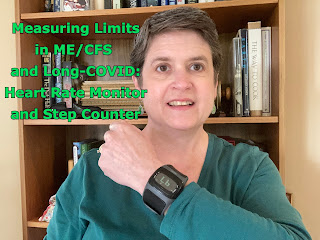I finally have some cautiously optimistic news to report, after three long months of post-COVID/worsened ME/CFS hell: I've had some good days--and even good streaks of days--in the past couple of weeks! Of course, I was crashed the past two days, but I was having a really good stretch before that. I'll talk more about recovery from COVID and long-COVID in my next post; I want to be sure of what is working and why.
In the meantime, I thought I'd share a new-to-me approach I've been using as another way to quantify my limits and know when I am doing too much.
Monitoring Heart Rate
In the midst of this post-COVID relapse that worsened my ME/CFS the past few months, I first turned once again to my trusty heart rate monitor. Typically, I do well enough with treatments that I know I am within my limits most of the time, and I only wear it when I am doing something particularly active, like taking a walk or going shopping. But with feeling crappy most of the time and crashing badly multiple times each week, I strapped it on and wore it continuously for a week or so, anytime I was awake. It confirmed what I suspected: my heart rate was higher than normal, and simple activities I could normally tolerate fine were now putting me over my limit and causing a post-exertional crash. Just being aware of that helped me to decrease my activity level, stay within my limits more, and reduce those crashes.
You can learn more about how to use a heart rate monitor to prevent post-exertional crashes in my blog post.
Counting Steps
About that same time, I learned about another way to measure my activity level. Now, don't laugh, but I only just got my first smart phone in summer 2020, an iPhone, so I am still learning about all the cool stuff that comes with it. I was reading an article (in AARP Magazine!) about what you can do with a smart phone, and it explained that iPhones come with a pedometer app in the Health button (a white square with a red heart in it on the home screen).
So, I began carrying my phone in my pocket with me all day long (I was normally leaving it on the kitchen desk while I was at home). I found that tracking my steps gave me another way to quantify my exertion level each day.
Of course, as with everything else (including heart rate monitors), we with ME/CFS and long-COVID use these tools differently than "normal," healthy people. As you know from TV, magazines, newspapers, and the internet, there are all kinds of encouragements to increase your steps, to aim for 5000 or 10,000 steps a day to improve your health! Instead, I use it to monitor and stay below what I have figured out is too much for me.
First, I just carried it in my pocket every day and checked it the next morning. How many steps did I take the day before? Did I crash or do I feel OK today? I quickly came to find that during this worsened period, I could handle 2000-2500 steps a day, maybe even 3000, if I kept my HR below its limits and felt good. Approaching 4000 steps a day, though, was my danger zone; I'd almost certainly crash the next day. I was surprised to find that even on a bad crash day, I still often took 1500 steps, just inside my house (we have a large house with a lot of stairs).
Again, I know I have been in worse shape than usual since I had COVID in January, so I don't know what my "normal" limits are. But having an idea of my current limits gave me another tool to try to stay within them.
The Health app on the iPhone also graphs your daily step data for you.
Here are my steps so far today (I took a walk this morning, clearly shown by the spike):
My steps this past week--you can easily see I was crashed yesterday!
My steps for the past month--Those days over 4000 almost always correspond with a resulting crash the next day:
And, even though I only started carrying the phone in my pocket in the past two months, I still found the last year's data interesting (the phone was usually in my purse or pocket anytime I left the house):
The monthly averages clearly show that I was doing quite well last May, before I got my two COVID vaccines, which set me back a bit. Then, my activity level gradually increased from July through December, when my 22-month relapse finally ended. You can very clearly see the month I had COVID in January--I barely moved from the couch or bed! And since then (and since I began carrying the phone all day), you can see a gradual increase in my activity level, which corresponds to a gradual improvement in how I'm feeling. Cool, right?
Using my phone as a step counter is just another tool to help me quantify and measure my limits so I can better stay within them and prevent post-exertional crashes. I actually have a beautiful new Apple Watch that my husband gave me for Christmas that should make this even easier (as well as monitoring my heart rate, which was its primary purpose), but I still need to figure out how to set it up and use it! Maybe I can manage that now that I'm beginning to feel better.
Do you count steps or monitor your heart rate?
How else do you use technology/your devices to help measure your limits or otherwise help with your ME/CFS or long-COVID?
Let me know since I now have a new device with lots of cool features to learn!
















